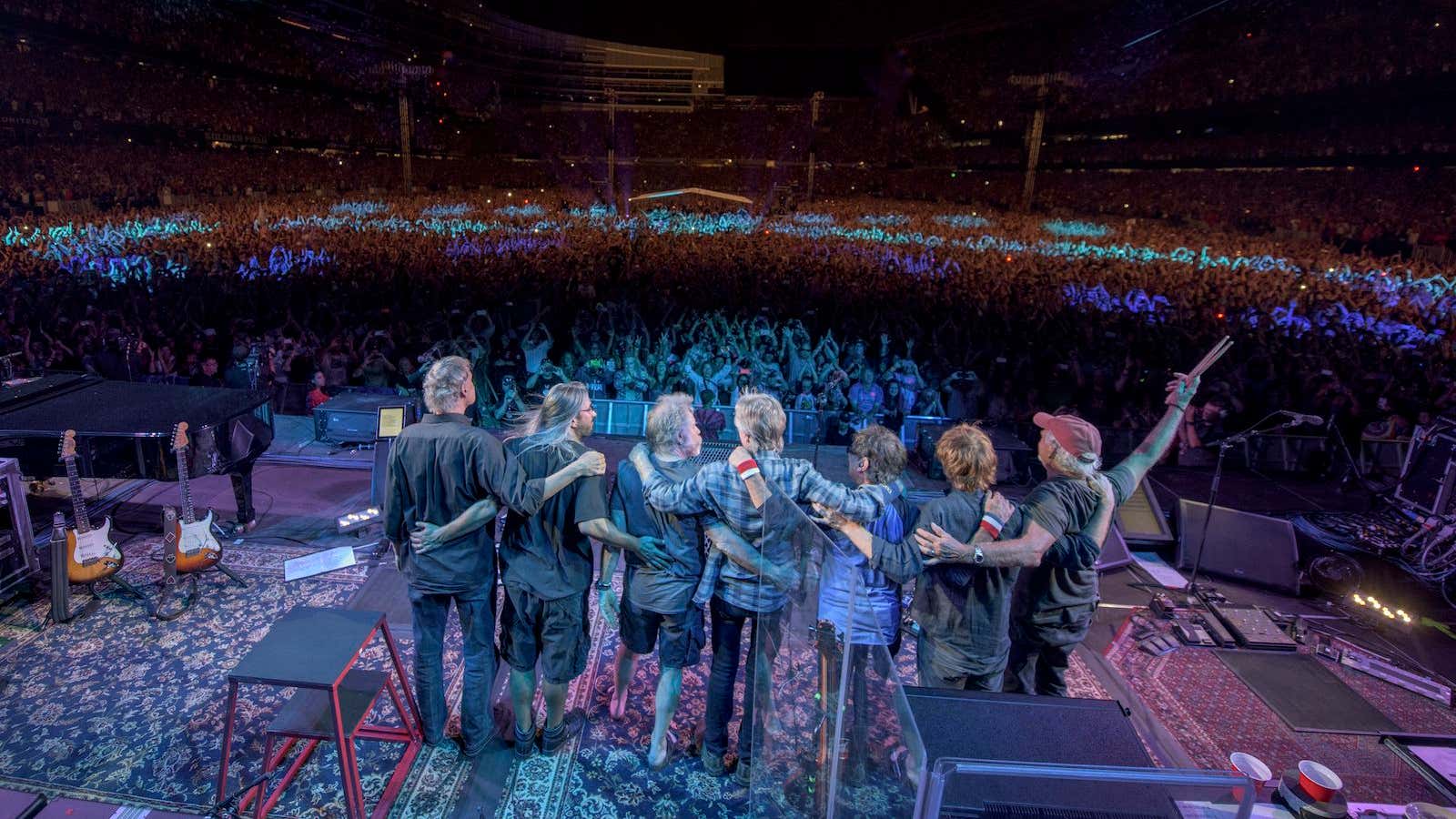A reporter at Chicago’s Soldier Field for the Grateful Dead’s climactic last show on July 5 described the record-breaking crowd as a “rolling sea of graying beards and ponytails, flowing skirts, cowboy hats and backward caps, flower crowns and bandannas.”
Maybe that’s just who could afford tickets to one of the most expensive concerts in history. From where I was, watching the show at a bar in Baltimore with fellow Dead fans, I didn’t smell any patchouli. My combat boots were not out of place. I stood next to an older black woman who nodded her head, with stately dreadlocks attached, to the rhythm emanating from the speakers. I debated transgender issues during set break.
The night marked the outro of a glorious era of American music. After 50 years, thousands of shows, and millions of inspired fans, the Grateful Dead’s “long strange trip” came to an end, culminating in a five-day California-to-Illinois Fare Thee Well tour. I was not among the privileged 71,000 who got to see the final concert in the flesh, but I jammed and cried along with my friends and the millions of live-streamed webcast viewers who made it the largest online music pay-per-view event of all time.
As a technologically inclined, black, gay hip-hop artist from East Baltimore who grew up on punk rock, I am not what most would consider a “typical” Dead fan. I don’t own a stitch of tie-dye. I wouldn’t even really call myself a “Deadhead”: I only discovered and fell for the Dead in 2012, at a relentless friend’s urging—17 years after Jerry Garcia died. Being born in the final days of Generation X with an ear calibrated to digital music, I am more likely to reach for my phone 10 minutes into an “epic jam” than to scream “woo!”
And yet, the Dead’s lyrics moved me.
“Shakedown Street” is, to me, a tale of a disdained city no more at home in 1985 than 2015. The exhortation of “Sugaree”—“just one thing I ask of you…just don’t tell ‘em you know me”—would resonate with every adulterer and closeted gay man on Earth. “Throwing Stones,” one of the Dead’s few political tracks, inspires me as much as any hip-hop does: a reminder that beyond all divisions of race, class, gender, and orientation, we are one human race on a (increasingly fragile) “big blue ball spinning, spinning free.”
And then there are the shows. A gathering of Deadheads—be it at Soldier Field for the Dead themselves; for offshoot bands Furthur and Phil Lesh & Friends; or for any number of Dead cover bands—is a place where people shed divisions and embrace a universal “phamily,” one that cuts across the boundaries of sex, class, and race. After a few inspirational songs I was intrigued; after my first Furthur show I was hooked; and I cried during “Jerry’s last show”—every time I watched it on YouTube.
The Grateful Dead’s live performances are timeless, obliterating ticket inventories in 2015 as they did in 1970, their music seemingly unbound by language or culture or even sound itself. As one deadhead blogger recalls, the band has always managed to bring together diverse elements of humanity:
You could see birds of every color at a show, black deadheads, latino deadheads, white deadheads, purple deadheads, gay deadheads…straight deadheads, junkie deadheads, corporate deadheads, intellectual deadheads, stoner deadheads, punk deadheads, jewish deadheads, christian deadheads, pagan deadheads, buddhist deadheads, atheist deadheads, deadheads with ties, republican deadheads, commie deadheads, activist deadheads, rich deadheads, poor deadheads, kind veggie burrito deadheads, I need a miracle deadheads, grubby parking lot deadheads, tapers, spinners, the whole panoply of universal color and expression.
Last Sunday I stood next to my ex-punk rocker friends, complete with tattoos, tearing up during “Cassidy” at the line “fare thee well now,” and crying as hard as any “hippie” during the second set.
Soldier Field may have been a sea of grey ponytails and flowing skirts, but watching around the world, we were all there. All ages. Baby Boomers, Gen Xers, Millennials. Republicans and Democrats. Hippies, punk rockers, business people, and construction workers. One big “rainbow flag of inclusiveness,” as the 48-year Dead veteran and ex-NBA star Bill Walton put it.
Dead fans of color do exist. We were at the shows—even if we didn’t necessarily appear in the pictures. LGBT Dead fans exist, and they danced alongside evangelicals and Orthodox Jews. The loss of one of the world’s legendary bands is mourned worldwide—even the Wu-Tang rapper RZA has touted his company Boombotix’s 50th-anniversary commemorative Grateful Dead speaker. Who else but Jerry Garcia could be a point of commonality for Barack Obama and Ann Coulter?
The final show ended with the words of drummer Mickey Hart echoing through the air, “This feeling we have here—remember it, take it home and do some good with it.”
We took that message home—home to East Baltimore, Brooklyn, Brazil, and the White House, as we did his next words: “Please be kind.”
